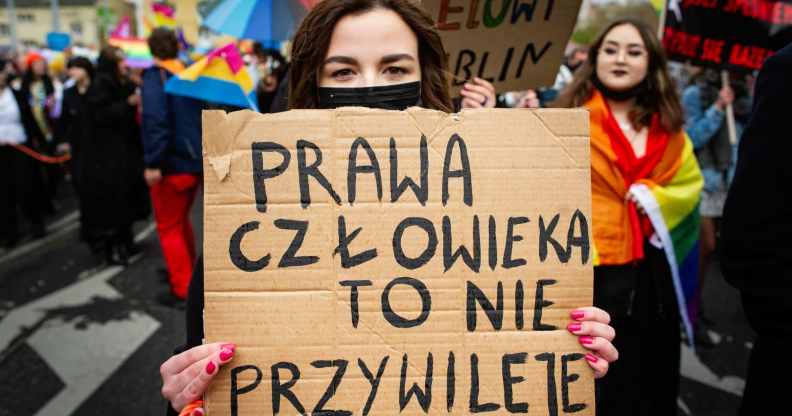Thousands urge Polish MP to kill horrific LGBT+ ‘promotion’ bill that would ban Pride

2021 Pride Parade in Lublin, Poland (Photo by Piotr Lapinski/NurPhoto via Getty Images)
Polish activists are fighting a reviled bill intended to stop the so-called “promotion” of LGBT+ lives and ban Pride parades.
The bill has been pushed by the conservative Life and Family Foundation, which recently lobbied successfully for a restriction on abortion rights. It was introduced as a citizen’s legislative initiative, which can be submitted to the Polish parliament if it receives signatures from at least 100,000 citizens.
Activists have confirmed that over 400 Catholic churches across the country helped to collect signatures in support of the bill among their members. If successful, it will also put an end to other LGBT+ events.
The parliamentary debate on the bill on 29 October rapidly turned heated. Krzysztof Kasprzak, one of the initiators, compared the LGBT+ community to Nazis, and accused it of seeking “to overthrow the natural order and introduce terror.”
Włodzimierz Czarzasty, a left-wing deputy speaker of parliament, called it the “most disgusting speech” he had heard in his time as a lawmaker.
The bill has been sent to Poland’s interior affairs commission, led by a member of the pro-LGBT+ Lewica alliance, Wiesław Szczepański, for further consideration.
A petition asking Szczepański to kill the bill has amassed almost 20,000 signatures at the time of writing.
“The ‘Stop LGBT’ bill is another vicious attack on the rights and lives of Polish LGBT+ people. As the chairman of the interior affairs commission you have the power to stop this bill and make sure it never comes into effect,” it reads.
“Please stand in solidarity with the Polish LGBT+ community and kill this bill.”
A homophobic backslide
Once, Eastern Europe was at the forefront of the fight for gay rights. In Poland, homosexuality was decriminalised 1932. The UK took another 35 years to reach a similar point, with the Sexual Offences Act of 1967 legalising consensual homosexual acts between over-21s.
But today, homophobic sentiment across Poland is on the rise, with swathes of the country declaring themselves “LGBT-free zones”.
The “propaganda” bill comes rapidly after the institution of anti-LGBT+ legislation in nearby Hungary. Far-right prime minister Viktor Orbàn passed a similar law in July, banning content that “promotes” LGBT+ issues from being shared with children, effectively prohibiting any discussion of LGBT+ themes in schools.
Agnieszka Kościańska, a visiting professor of anthropology and ethnology at Oxford University, says that this backslide is not restricted to just LGBT+ rights.
“The movement that is attacking women’s rights, LGBTI rights, sexual and reproductive rights … they have become a lot more present, resourced and active across Europe,” she told CNN.
In both Hungary and Poland, these laws are being presented as a point of national pride, with progressive values viewed as an attack on their respective identities. Kościańska puts the movement towards conservative values down to the region’s complex history.
The rainbow wall
Research carried out by the Pew Research Centre demonstrates a clear divide in views between countries in western and eastern Europe. Those that lay behind the “Iron Curtain” now largely demonstrate more homophobic sentiment. This division has been coined ‘the rainbow wall’.
For example, data looking at a group of former members of the eastern bloc demonstrates an average anti-LGBT+ sentiment of 44 per cent. In western Europe, this same figure is just 11 per cent.
For human rights campaigners, opposing anti-LGBT+ sentiment is an uphill battle. Amnesty International has claimed that “signing the citizens’ initiative into law would put the rights of LGBTI people in Poland at greater risk than ever”.
“Pride is an important moment for LGBTI people and their allies to celebrate their love. It is also a protest against exactly the kind of discrimination that the Polish authorities are gradually writing into the law,” said Nils Muižnieks, Amnesty international’s regional director for Europe,.
“This proposal, which is part of a wider crackdown on LGBTI rights, has no place in any parliament. We call on Polish MPs to recognise that love is love, and reject this hateful proposal which is discriminatory to its core.”

